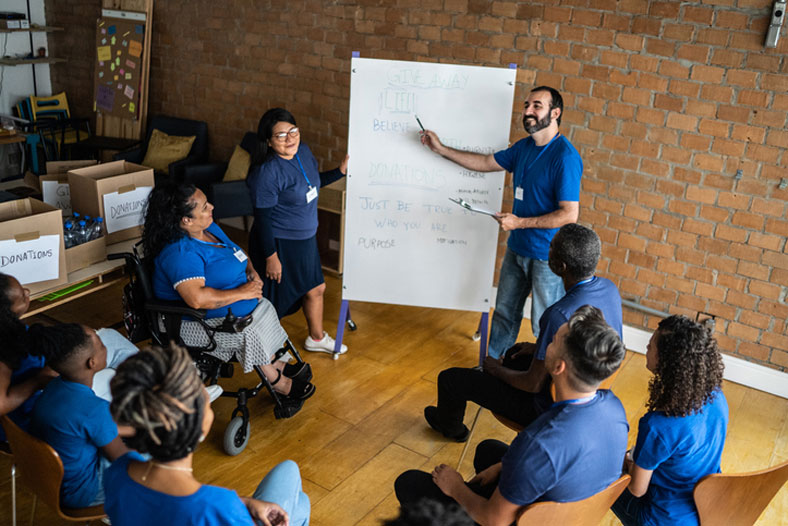Edited by Alyssa Middleton

Deciding to pursue a Master’s in Social Work (MSW) is a big decision. During your studies, your intellect, drive, and resourcefulnesswill be put to the test. But at the end of it all, you stand to become exactly what so many Californians need — an experienced, highly-skilled advocate. With an MSW, there are virtually endless ways to fill that role.
From advanced direct service positions to crucial administrative, policy making, and research roles, here are a handful of Masters of Social Work jobs you can find in California. Each one relies on different strengths but they’re all vital to improving lives for people across the state.
Licensed Clinical Social Worker (LCSW)
In California, LCSWs are the only social workers who can diagnose specific mental health disorders and provide advanced counseling services like psychotherapy and cognitive behavioral therapy.
However, that’s not all LCSWs can do. Depending on the type of organization they work for, they can also:
- Conduct research
- Supervise other social workers and members of mental healthcare teams
- Perform crisis interventions
- Design treatment plans
- Refer clients to other mental health professionals
- Guide organizational policy
But even though LCSWs frequently work in mental health treatment centers, their talents are needed in almost every type of organization. Many provide mental health services to clients in jails, schools, hospitals, and senior living communities. Others help nonprofits and community-based organizations run research initiatives and clinics. Because LCSWs work at the top of their license, this can open doors to many high-level social work jobs.
California’s Troubling Behavioral Health Skills Gap
In early 2023, the County Behavioral Health Directors Association (CBHDA) of California reported a worrying trend: more residents need mental health services but the workforce can’t keep up.
According to their research, 31% of psychiatrists are nearing retirement but college program enrollment numbers are down. 90% of California counties report having trouble recruiting and retaining mental health professionals including Licensed Clinical Social Workers. And as the state diversifies racially, ethnically, and linguistically, the behavioral health workforce becomes less and less representative of the people it serves.
California lawmakers have already pledged to dedicate more than $200 million to bolstering the state’s mental health workforce. They plan to use this funding to support higher education programs, give financial aid to students who commit to working for state behavioral health departments, and offer more competitive salaries. So with mental health access both in the spotlight and in peril, an LCSW should have no problems finding employment.
School Social Worker
School social workers have some of the most dynamic jobs in the entire field. Along with helping students succeed socially, emotionally, and academically, they’re there to support the entire community. They can help teachers develop and carry out individual education programs. They can teach parents how to support students at home. And when it comes to developing inclusive policies, there’s perhaps no better advocate than a seasoned social worker.
On top of carrying out these broad duties, school social workers:
- Help teachers identify social, emotional, and environmental stressors that impede student progress
- Provide crisis intervention for students in dangerous situations
- Identify and report suspected abuse and neglect
- Counsel students individually or in groups
- Develop preventative programs based on relevant issues like bullying, teen pregnancy, and substance abuse
- Keep their colleagues informed about child development best practices and new trends emerging in their community
In California, school social workers and counselors must obtain the Pupil Personnel Services Credential (PPSC) before starting employment. But while state policies say you only need a bachelor’s degree to earn the PPSC, private and public schools alike tend to favor applicants with an MSW. And because behavioral issues are often central to classroom conflicts, many schools need LCSWs.
Medical Social Worker
Social workers with BSWs often work in medical facilities, but their duties are typically restricted to basic tasks like educating clients and connecting them to resources. Masters of Social Work jobs in the medical field are a little more involved.

As a Masters educated Medical Social Worker, you might:
- Assess patients to determine their emotional, physical, and financial needs
- Provide counseling to patients facing difficult diagnoses and chronic diseases. This often includes family counseling, as well
- Ensure colleagues provide holistic, ethical, and patient-centered care
- Train medical professionals about topics like cultural competence and trauma-informed care
- Respond to reports of abuse whether it occurs in your own community or somewhere else
- Coordinate discharge plans
- Compile patient-reported outcome data, present it to colleagues, and use it to improve services
- Run inclusive health clinics for underserved populations like people of color, the impoverished, and members of the LGBTQ+ community
Hospitals, health clinics, and other broadly-focused medical facilities employ medical social workers, but they can also be found in more specialized environments. This includes nursing homes, rehabilitation clinics, and in-home care providers. But regardless of where they go, these highly-trained professionals are committed to advocating for patients.
Crisis Intervention Specialist
Many people who need social services are in the middle of a crisis. Some, though, are in immediate danger. Abusive partners, the late stages of addiction, and imminent mental health crises put their lives at risk. Crisis intervention specialists usher them through the earliest moments of these dire situations.
Their duties vary from case to case, but crisis intervention specialists often:
- Assess clients’ psychological state and immediate needs. This includes evaluating risks to the client’s wellbeing
- Help clients through intense emotional situations by employing de-escalation techniques and teaching coping skills
- Provide counseling and trauma-informed care
- Connect clients to resources. People in immediate danger often need things like emergency housing, residential treatment for mental health and substance abuse issues, medical care, and legal representation
- Remove clients (especially children, the elderly, and other particularly vulnerable people) from dangerous living conditions
- Create emergency plans with clients who may face life-threatening crises
- Collaborate with law enforcement, courts, service providers, and anyone else who can ensure their client’s safety
While crisis intervention specialists often work for mental health and substance abuse treatment centers, they can be found working for just about any agency that serves at-risk populations. Many find jobs in homeless shelters, schools at every level, and disaster relief organizations. But no matter where they work, resourcefulness is often their defining trait.
Other Frontline Masters of Social Work Jobs and Titles
Unlike other careers, advancing your social work career doesn’t mean you have to take on administrative roles for a bigger paycheck. Every corner of the field needs educated and experienced frontline professionals. But while the number of job postings for advanced social work positions can be encouraging, it can also be difficult to find the one that’s right for you.
Many Masters of Social Work jobs are listed simply as “Social Worker,” but looking for the following titles can help you narrow your search:
- Social Worker II or III (government agencies often use this designation for senior positions)
- Master Social Worker
- Senior Social Worker
- Masters-prepared Social Worker
- Social Worker, MSW
- Clinical Social Worker
These titles often come with more duties than entry-level positions. This can include client assessment, care plan development, and taking on more complex cases. Frontline Masters of Social Work jobs can be found in just about any type of agency.
Social Work Case Manager or Care Coordinator
Case managers and care coordinators ensure all clients have access to the resources they need to succeed. While this is an important duty for every social worker, large agencies often need experienced specialists dedicated to this one task. This is especially true for organizations that offer multiple types of services or who have diverse client populations.
Case managers support their clients and colleagues by:
- Conducting client assessments and checking in regularly with clients
- Helping clients establish clear goals and create care plans
- Identifying resources and connecting clients to them
- Coordinating between different service providers on behalf of their clients
- Educating clients and their loved ones about the services they’re eligible for
- Advocating for clients when their needs aren’t being met
- Dispersing cases amongst the frontline workforce
No matter what context case managers work in, they need well-developed organizational and collaborative skills. But on top of that, they also need a firm grasp of organizational policy, local laws, and what social services are available in the area.
Researcher
Researchers are vital to keeping social work practical and effective. As the population expands and diversifies, they investigate new problems, re-evaluate existing techniques, and help their colleagues develop ground-breaking evidence-based interventions. But social work research isn’t just useful to professionals. It has the power to spark important conversations and drive widespread social change.

Masters of Social Work jobs in research include diverse duties like:
- Developing hypotheses about specific issues, populations, and social work techniques
- Gathering information through surveys, interviews, and data analysis
- Designing ethical experiments
- Leading teams of other researchers
- Reviewing existing literature to identify gaps in the field
- Publishing results in peer-reviewed journals
- Speaking at seminars and meetings
- Using research to influence organizational policy and evaluate programs
- Writing grant proposals
- Promoting scientific social research in the public domain
Universities are hubs for social work research, but government, nonprofit, and private organizations often need research-focused leaders to design new programs and evaluate existing ones. Some researchers even open their own consulting firms to help smaller agencies serve their clients more efficiently.
Lecturer or College Social Work Instructor
Not everyone who teaches social work at the collegiate level has a PhD. Many programs hire instructors with MSWs to be lecturers and adjunct faculty members. In fact, many people pursuing Doctorates of Social Work (DSWs) and PhDs teach as they earn their degrees.
However, most adjunct faculty work part-time and only take on one or two classes at a time. And while they’re responsible for teaching classes and monitoring student progress, adjunct faculty members typically don’t have as many administrative duties as their full-time colleagues. At most schools, candidates must have a few years of experience in the field.
Program Administrator
Each person who turns to a social service agency for help has their own unique needs. And the professionals who serve them need to be able to meet those needs quickly and efficiently. Program administrators lay the groundwork that makes that possible.
Some of the important behind-the-scenes things you might do as a social service program administrator include:
- Developing new programs to address the changing needs of your clients
- Screening and hiring a diverse selection of social service professionals
- Creating ethical, streamlined procedures that promote client and employee wellbeing
- Fostering relationships with other agencies
- Managing budgets and seeking funding from private and government sources
- Seeking opportunities for community engagement, outreach, and education
- Finding ways to offer training and professional development opportunities
- Helping frontline workers through particularly difficult cases
The nature of these duties can change based on the type of agency you work for. For instance, at a hospital, you might help doctors meet their patients’ psychosocial needs as opposed to a homeless shelter where seeking help from community stakeholders is crucial. While some people transition into these roles after years in the field, others pursue MSWs with an emphasis in an area like administration or policy management.
Community Organizer
In many cases, issues like homelessness, pollution, and public health emergencies can’t be solved by helping individuals. Organizations big and small need to elicit help from the public itself. Community organizers are responsible for doing just that.
Community organizers empower populations to become their own advocates by:
- Identifying needs within entire communities through surveys and meetings
- Crafting awareness campaigns that encourage residents to participate
- Developing public education initiatives
- Fostering partnerships between community stakeholders. This can include community-based service agencies, healthcare providers, local businesses, and other organizations whose involvement can be impactful
- Building leadership skills within the communities they serve
- Advocating for more resources to be brought into underserved communities
- Assessing ongoing community-building efforts

These duties make community organizers a lynchpin between the public, private businesses, and social service agencies. From government housing agencies to hospitals and small community-based charities, all types of organizations need people who know how to inspire change and create cooperation.
Private Practitioner
Some social workers want to go into private practice. While taking this route requires a solid understanding of social work principles, legal and ethical requirements, and business, it can allow you to leverage your talents to help the people you’re most passionate about serving.
Many professionals who go into private practice offer:
- Child and family therapy
- Behavioral therapy and other clinical services
- Bereavement counseling
- Mental health services
- Substance abuse treatment
- Services to specific groups like veterans, immigrants, and the LGBTQ+ community
- Social research services
- Consultation services to private businesses and nonprofit organizations
Your practice can be as big or small as you want it to be. You can work part-time and offer services yourself or employ other professionals and turn it into a full-fledged agency.
However, the Board of Behavioral Sciences (BBS) says only LCSWs can run private social work practices in California. And depending on what types of services you provide, you may need other licenses and certifications, as well. But despite these regulations, running an independent practice can be one of the most rewarding social work positions.
Our guide on social work salaries in California provides a full break-down of what you can expect to earn in different roles and license levels.




